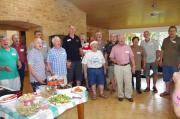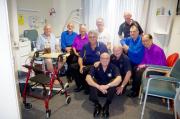Frequently asked questions
What style of music do we sing?
Our style is called barbershop. It is four‑part a cappella harmony, sung without instruments. Our music is arranged to be accessible and singable, and focuses on close harmony, clear melodies, and a strong sense of tuning and blend.
Isn’t Barbershop singing really just for quartets?
Quartets are a well‑known and important part of barbershop singing, and many choruses encourage and support them. At Hills Harmony, we sing together as a full chorus. Some members also choose to form or join quartets alongside chorus singing, which can be a fun and rewarding extension for those who want it. Others are perfectly happy singing only as part of the chorus, enjoying the full, rich sound that comes from many voices working together. Both paths are valued, and there’s no expectation to sing in a quartet unless it interests you.
How long have you been going?
Hills Harmony Chorus began in mid‑1996 and has been developing its sound ever since. Over the years, we’ve enjoyed success at both local and national level, with highlights listed on our Awards page.
Barbershop singing, as an organised a cappella style, developed in the United States in the mid‑20th century and has been part of the Australian choral scene since the 1980s. Today, Barbershop Harmony Australia supports a growing community of choruses and quartets across the country.
What sort of songs do you sing?
Our repertoire covers a mix of well‑known classics and contemporary material, all arranged in the barbershop a cappella style. Song choices evolve over time and reflect the interests of the chorus and the musical direction of our Music Director. We’re always open to suggestions, and new material is regularly introduced through custom arrangements.
Who else sings Barbershop Music?
Barbershop singing is enjoyed by many thousands of men in what is the largest singing association in the world. It is popular in USA, Germany, Canada, the United Kingdom, New Zealand, Scandinavia, South Africa and other countries, and is continuing to grow here in Australia.
Is there anything for female singers?
There certainly is. Barbershop Harmony Australia has become inclusive in recent years, and singers of all genders are welcome at BHA organised events. Individual choruses can choose whether to remain single gender or mixed. Hills Harmony has chosen to be a mixed chorus and welcomes singers of any gender. While we do not currently have female members, we are open and inclusive by design and would be delighted to hear from anyone interested in singing with us.
And if I was interested in singing with you.......
Where can I get more information? We have a separate page with lots more information, but first, here are some more answers to some common questions
Do I have to be able to read music?
No. You do need to be able to sing in tune, learn your part, and follow the direction of the Music Director. We use a mix of learning methods to help singers, including audio files, sheet music, and group teaching. A basic sense of rhythm helps, and a sense of humour certainly doesn’t hurt.
Do I need to have a good voice?
What exactly is a “good” voice? We just need ordinary voices without affectation such as vibrato, tremolo etc. We're not opera singers. Our Music is written for ordinary voices, so no matter if your voice is high, or low or somewhere in between, there's a place in the music where you'll feel comfortable.
What if I haven't sung before, or not for a very long time?
We'll give you every help we can, including choosing the best part for you, and will help you improve your technique. We're practicing and improving our techniques all the time. The main things needed are the ability to sing in tune, to be able to learn your part, and to follow the directions of the Music Director. We will teach you how to sing.
How often do you rehearse?
We meet each Monday evening from 7.30pm to 9.30pm in the upstairs room of Dayspring Church Hall, 15 Salisbury Rd, Castle Hill NSW 2154.
What costs are involved?
As you would expect, we do have various ongoing expenses. We need to purchase our sheet music and training tracks and, of course, pay the appropriate Copyright fees. We also need to hire the hall, pay for coaching sessions, costumes, Public Liability and other insurances as well as our registration with State and National bodies. We also occasionally sponsor extra tuition and travel costs for members seeking additional education. It works out at around $46 per week.
For more information, go to the "Become a Member?" page
Our style is called barbershop. It is four‑part a cappella harmony, sung without instruments. Our music is arranged to be accessible and singable, and focuses on close harmony, clear melodies, and a strong sense of tuning and blend.
Isn’t Barbershop singing really just for quartets?
Quartets are a well‑known and important part of barbershop singing, and many choruses encourage and support them. At Hills Harmony, we sing together as a full chorus. Some members also choose to form or join quartets alongside chorus singing, which can be a fun and rewarding extension for those who want it. Others are perfectly happy singing only as part of the chorus, enjoying the full, rich sound that comes from many voices working together. Both paths are valued, and there’s no expectation to sing in a quartet unless it interests you.
How long have you been going?
Hills Harmony Chorus began in mid‑1996 and has been developing its sound ever since. Over the years, we’ve enjoyed success at both local and national level, with highlights listed on our Awards page.
Barbershop singing, as an organised a cappella style, developed in the United States in the mid‑20th century and has been part of the Australian choral scene since the 1980s. Today, Barbershop Harmony Australia supports a growing community of choruses and quartets across the country.
What sort of songs do you sing?
Our repertoire covers a mix of well‑known classics and contemporary material, all arranged in the barbershop a cappella style. Song choices evolve over time and reflect the interests of the chorus and the musical direction of our Music Director. We’re always open to suggestions, and new material is regularly introduced through custom arrangements.
Who else sings Barbershop Music?
Barbershop singing is enjoyed by many thousands of men in what is the largest singing association in the world. It is popular in USA, Germany, Canada, the United Kingdom, New Zealand, Scandinavia, South Africa and other countries, and is continuing to grow here in Australia.
Is there anything for female singers?
There certainly is. Barbershop Harmony Australia has become inclusive in recent years, and singers of all genders are welcome at BHA organised events. Individual choruses can choose whether to remain single gender or mixed. Hills Harmony has chosen to be a mixed chorus and welcomes singers of any gender. While we do not currently have female members, we are open and inclusive by design and would be delighted to hear from anyone interested in singing with us.
And if I was interested in singing with you.......
Where can I get more information? We have a separate page with lots more information, but first, here are some more answers to some common questions
Do I have to be able to read music?
No. You do need to be able to sing in tune, learn your part, and follow the direction of the Music Director. We use a mix of learning methods to help singers, including audio files, sheet music, and group teaching. A basic sense of rhythm helps, and a sense of humour certainly doesn’t hurt.
Do I need to have a good voice?
What exactly is a “good” voice? We just need ordinary voices without affectation such as vibrato, tremolo etc. We're not opera singers. Our Music is written for ordinary voices, so no matter if your voice is high, or low or somewhere in between, there's a place in the music where you'll feel comfortable.
What if I haven't sung before, or not for a very long time?
We'll give you every help we can, including choosing the best part for you, and will help you improve your technique. We're practicing and improving our techniques all the time. The main things needed are the ability to sing in tune, to be able to learn your part, and to follow the directions of the Music Director. We will teach you how to sing.
How often do you rehearse?
We meet each Monday evening from 7.30pm to 9.30pm in the upstairs room of Dayspring Church Hall, 15 Salisbury Rd, Castle Hill NSW 2154.
What costs are involved?
As you would expect, we do have various ongoing expenses. We need to purchase our sheet music and training tracks and, of course, pay the appropriate Copyright fees. We also need to hire the hall, pay for coaching sessions, costumes, Public Liability and other insurances as well as our registration with State and National bodies. We also occasionally sponsor extra tuition and travel costs for members seeking additional education. It works out at around $46 per week.
For more information, go to the "Become a Member?" page




